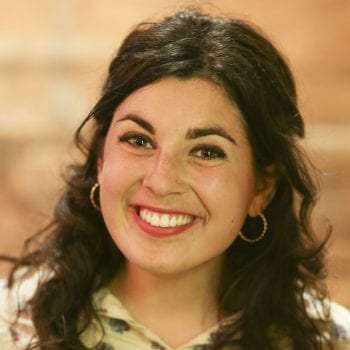Molly Brodsky, a senior and Stern Family Civic Scholar, delivered a powerful speech to first-year students and their families at convocation in August 2017. Brodsky is double majoring in anthropology: global health and the environment, and women, gender, and sexuality studies.
I love semi-colons.
I think the semi-colon does something pretty magical. It takes two entities—two complete parts that are whole on their own—and smushes them together. You could have two sentences, but—no—the semi-colon transforms each one into a puzzle piece. We’ve all heard Aristotle’s famous words, “A whole is greater than the sum of its parts,” but—sorry, Aristotle—I think the semi-colon takes it a step further. Yes, the whole becomes greater, but each side? It’s enhanced by this newfound partnership, too. Each makes the other more significant and stronger on its own—this crazy symbiotic relationship going on.
But how do we do that? How do we begin to semi-colon or link up with the people, places, and things around us? How do we get here and realize that the environment we are in is full of magic and awe and issues and questions and conflicts that are in need of us—our hearts, our brains, our eyes, and our attention? That they are in need of you. That as of right now, you are a piece of this sentence we call Washington University. And that as of now you have the opportunity, the challenge, and the privilege to define what those very words mean and, in turn, how those words define you.
Up until about a year ago, I was really focused on titles. On labels. On nouns. On the “whats.” We all do it; it’s natural, a way to understand ourselves. And, hey, maybe that’s how you’ve understood yourself, too. “The Athlete” or “The Scholar” or “The Artist.” The, the, the…
I saw my worth and my ability to contribute through the titles I held. In what I did. And—in many ways I still do, but I think I’ve moved beyond just the “whats.”
Just over a year ago, I was working on a farm in England. I remember the first conversation I had that summer. A middle-aged woman came to the farm to buy some vinegar. As we started talking, I expected that she would ask what I studied. But she didn’t. She didn’t ask what I studied, or what I wanted to do, or, well, any “what” questions. She asked me why and how. Why was I here? How did I want to live my life?
So, I made a list. I made a list of the activities I did, the things I studied, my on and off campus involvements. And under each title—each noun, if you will—I wrote out the qualities of a person who has this title. Like RA—supportive, present, responsible. Civic Scholar—aware, critical, engaged.
Then I made one more category on a separate page. I wrote “Molly” on top. The only title or noun or “what” that is permanent. And I started to move the qualities I associated with my other nouns under my own name, to think about how “what” I did became a part of me. That when I graduate—which, scarily enough, I’ve started to think about—those titles may disappear, but I’ll have what those experiences gave me—the bits and pieces that went beyond the nouns and just became a part of me. A part of that permanent title, “Molly.”
When we focus on “hows,” we see ourselves—and this campus, and this city—in new ways. Opportunities for meaning pop up everywhere. A walk in a new part of this city becomes significant. A slow “thank you” in line at the Bear’s Den becomes your trademark. It’s the way you lead your club meetings, checking in with each member before the agenda begins. Or the way you’re walking, smiling at those you share this space with. Or maybe it’s the way you look someone in the eye, ask how their day is going and really listen.
When the “hows” are what begin to matter, what happens? You become invested in those around you in a new way, in this city in a new way. You think critically about things that appear simple or automatic. Like a street sign, or a building structure, or the stops on the metro. These things? They’re not just “whats”—it’s about why they exist, how they impact the community, and the role and responsibility you now have as a seer, as a thinker.
You step off of this campus and learn from places that aren’t labeled as “classrooms.” You look up to those not necessarily labeled as the “leaders.” And you begin to have an impact in surprising and profound ways.
So, welcome to St. Louis. Welcome to WashU. Welcome to all of the unlabeled places and people and things you have yet to discover, you have yet to be invest in, you have to semi-colon up with.
And while you’re here? I encourage you—I challenge you: Look beneath the surface. Look beyond the “whats.” Look at your friends, your family, and yourself with fresh eyes. Inspire and be inspired. Create and be created. It’s all part of the cycle.
And then, all of a sudden, you recognize the opportunity for meaning, for impact, for influence, everywhere you look. Everywhere you look. Even in a semi-colon.
